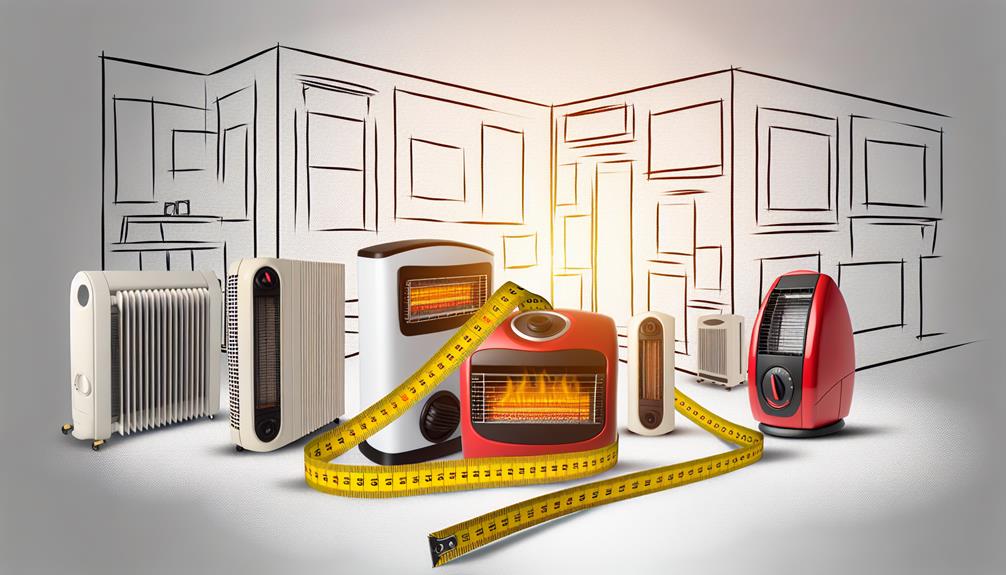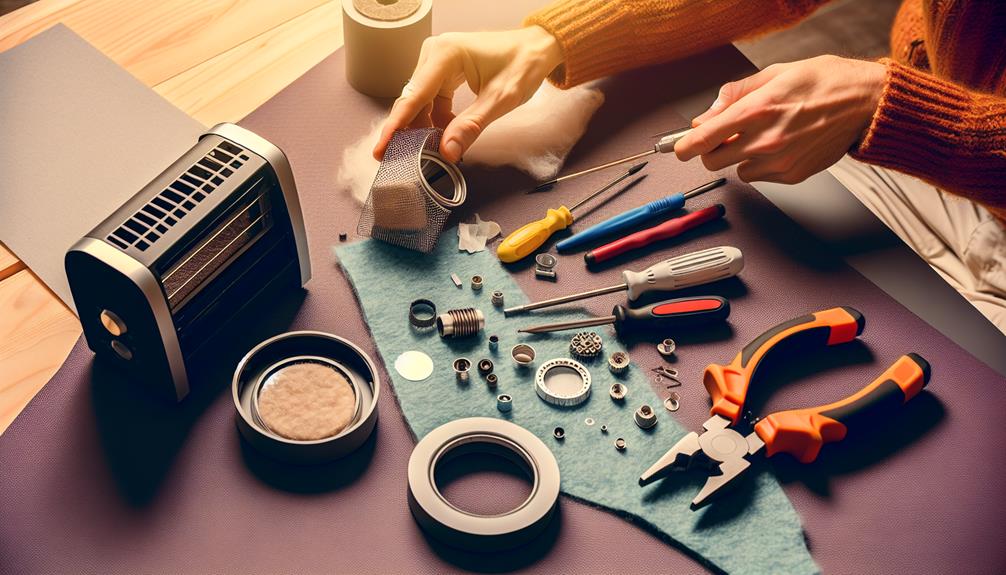Is it really possible to find a portable heater that not only warms your space but also keeps your energy bills in check? You've likely pondered this question as you wrap yourself in layers, trying to resist the chill that stubbornly lingers in your home or office. The market is flooded with options, and sifting through them can seem daunting. But don't worry; you're about to uncover the essential factors that'll guide you through the maze of wattages, safety features, and heating technologies. With a keen eye, you'll learn how to zero in on a model that promises comfort without costing the earth. So, as the cold months loom on the horizon, let's embark on a journey to ensure you're equipped with the knowledge to choose a portable heater that stands up to the hype and delivers the warmth you need.
Key Takeaways
- Understanding the different types of portable heaters, such as convection, radiant, and ceramic, can help you choose the right one for your needs.
- Consider the size of your space and the heating capacity needed when selecting a portable heater.
- Safety features, such as overheat protection, automatic shut-off, and UL certification, should be taken into account when buying a portable heater.
- Look for energy-efficient features like adjustable thermostats, programmable timers, and eco-modes to save energy and reduce costs.
Understanding Heater Efficiency
When choosing a portable heater, it's crucial to understand how different types impact your energy consumption and heating performance, particularly through features like programmable thermostats and eco-modes. The efficiency of a space heater is often measured by how effectively it converts electrical energy, measured in watts, into heat. Portable heaters with energy-efficient features can significantly reduce electricity usage, lowering your energy bills while maintaining comfort.
Types of space heaters include convection models with a heating element, often in ceramic heating units, and radiant types that directly warm objects and people. Convection heaters are typically more suitable for heating entire rooms, whereas radiant heaters provide targeted warmth. Ceramic heating options often incorporate fans to distribute heat more evenly, adding to their efficiency.
Energy-efficient features to look for include adjustable thermostats, which allow you to set a desired temperature, and auto or eco-modes that adjust the heating power to maintain comfort while minimizing energy use. Multiple heat settings also contribute to efficiency by enabling you to choose the lowest comfortable setting.
Types of Portable Heaters
You'll find a range of portable heaters, each with distinct mechanisms and advantages, to suit your specific heating needs. When buying a space heater, consider gas and oil-filled options for silent, efficient warmth that lingers. If you're delving into an industrial heater buying guide, note that these types can provide consistent heating power for larger spaces.
Electric infrared heaters are a standout for their energy-efficient nature. Unlike traditional heaters that warm the air, these target objects and people directly, with materials like quartz used in their design. The result is less wasted energy and immediate comfort. Safety is paramount, so look for models with protective features.
For dispersed warmth, a ceramic heater with a fan that distributes heat may be ideal. These units harness a ceramic element for quick and efficient heating. Alternatively, convection heaters excel in heating air through an element and circulating it, which is practical for even temperature distribution.
Sizing Your Space Heater

To ensure your space heater efficiently warms the intended area, it's essential to match the unit's heating capacity with the size of your room. Start by calculating the square footage; this measurement is pivotal in determining your precise Heating Needs. Select an Energy-Efficient Space heater that offers the right watts of heating power for your space. Typically, you'll want about 10 watts per square foot of room.
If your goal is to heat a small area or provide supplemental heat, spot heating models are practical. However, for larger spaces, you'll need a heater with a greater capacity to heat the room effectively without skyrocketing your energy bill. Heater features like programmable timers and thermostats contribute significantly to energy savings by allowing you to tailor heating times to your schedule and maintain a consistent room temperature.
Before making a purchase, ensure the heater's footprint is compatible with your available space. A cumbersome unit might be powerful, but it should also fit comfortably in your room. Remember, a well-sized heater is not just about power; it's about how it integrates with your lifestyle and space for maximum efficiency and comfort.
Safety Features to Consider
When selecting a portable heater, it's critical you prioritize safety alongside efficiency. Ensure the heater you choose is equipped with overheat protection mechanisms and a tip-over shut-off feature to mitigate fire risks. Additionally, verify that the model bears a safety certification from a reputable testing laboratory, confirming its adherence to established safety standards.
Overheat Protection Mechanisms
Ensuring your portable heater includes overheat protection mechanisms is crucial for preventing potential fire hazards and maintaining safety in your home. When selecting a space heater, consider these essential safety features:
- Automatic Shut-Off: Look for electric heaters that automatically shut off when reaching a high-risk temperature.
- UL Certification: Choose heaters with a UL label, confirming they meet rigorous safety standards.
- Thermostatic Control: Opt for models with thermostatic control to manage room temperature efficiently and avoid unnecessary heat and energy consumption.
- Tip-Over Safety Switch: Ensure the space heater has a tip-over safety switch, especially if you have kids or pets, to cut power if knocked over.
Adhering to these safety guidelines is key to a safe, warm, and efficient heating experience.
Tip-Over Shut-Off
Prioritize a portable heater with tip-over shut-off to safeguard against accidents, as this feature immediately halts operation if the unit is knocked over or tilted. When selecting the best space heater for your needs, consider this key safety feature. Heaters with built-in tip-over shut-off sensors are practical for any space, reducing the risk of fires and ensuring safe heating practices. This technical specification is vital—don't overlook it during your industrial heater buying process. It's not just about the heating capability; it's also ensuring safe use. Set the timer, adjust the thermostat, but always confirm that tip-over shut-off is present. It's a non-negotiable feature that could be the difference between a cozy room and a call to emergency services.
Certified Safety Standards
Beyond the vital tip-over shut-off feature, it's essential to seek out portable heaters that meet certified safety standards from reputable testing organizations. When selecting the best space heater to complement your central heating, consider the following:
- Look for certification from UL or ETL, ensuring the heater type you choose adheres to rigorous safety protocols.
- Opt for space heaters with built-in overheat protection to prevent potential fire hazards.
- Select heaters emit safety with flame-resistant materials, adding an extra layer of protection.
- Choose heaters with three heating settings that also offer supplemental heating without taxing your electric bill excessively.
These technical and practical considerations are crucial in safeguarding your home while keeping it cozy.
Cost and Energy Savings
As you evaluate portable heaters, pay close attention to heater efficiency ratings, which can greatly impact your long-term savings. Analyzing the cost-effectiveness of a heater involves more than the upfront price; it requires a long-term savings analysis to assess the true value. To maximize cost and energy savings, consider heaters with lower wattage that still provide adequate heat for your intended space.
Heater Efficiency Ratings
When selecting a portable heater, understanding its efficiency rating is crucial for gauging long-term cost savings and energy consumption. Here's what you need to know:
- Energy Consumption: Heater efficiency ratings tell you how much electricity the space heater uses per kilowatt-hour, directly impacting your utility bills.
- Operating Costs: A higher rating means lower operating costs, so you'll save money in the long run.
- Infrared Heaters: Models like infrared heaters warm objects directly, which can radiate heat more effectively and conserve energy.
- Adjustable Thermostats: Look for heaters with adjustable thermostats, as they allow you to warm a room to your comfort level without wasting energy.
Using these heater tips, you'll be able to choose a heater that aligns with both your heating needs and energy-saving goals.
Long-Term Savings Analysis
To maximize your investment, it's essential to analyze the long-term cost and energy savings of various portable heater models before making a purchase. When buying an efficient portable heater, you'll want to look for features like programmable thermostats and multiple heat settings, which can significantly reduce energy consumption. Remember, every watt counts, especially in the cold winter months across the lower 48 states where heating demands soar.
Conduct a long-term savings analysis by comparing the energy per hour used by different heaters—ceramic, radiant, or oil-filled—and their ability to provide supplemental heat without overburdening your indoor air quality. An efficient space heater not only saves you money but also ensures a warm, comfortable environment, balancing initial costs with future savings.
Maintenance and Care Tips

Ensure your portable heater's longevity and efficiency by adhering to regular cleaning and maintenance practices. Space heaters are invaluable for their ability to quickly add warmth to any room, but to keep them running smoothly and safely, you'll need to follow some key maintenance and care tips.
Here's how to keep your portable heater in top condition:
- Regular Cleaning: Make sure the heater is unplugged, then clean the exterior and air vents to prevent dust buildup. This ensures proper airflow, which is crucial for efficient heating.
- Filter Replacement: If your heater has an air filter, check and replace it as the manufacturer recommends. A clean filter maintains efficient operation and contributes to little noise interruption.
- Cord Inspection: Inspect the power cords and plugs for damage or wear. Replace them if needed to avoid electrical hazards, ensuring you can safely use the room without concerns.
- Component Check: Tighten any loose screws and fasteners periodically. This maintenance step offers supplemental stability as you move the heater from room to room.
Frequently Asked Questions
What Type of Portable Heater Is the Most Energy-Efficient?
You're hunting for the most energy-efficient portable heater, right? Consider infrared technology and ceramic models for their zonal heating capabilities. Oil-filled radiators excel with eco mode features, while convection heating ensures even warmth. Heater sizing is crucial; too large wastes energy. Look for programmable thermostats to maintain comfort efficiently. Remember, proper heater placement optimizes performance. Lastly, don't overlook safety features—their importance can't be overstated.
How Do I Choose an Efficient Space Heater?
To choose an efficient space heater, consider heating capacity for your climate and room size. Seek out models with thermostat control to save energy. Examine heater design for portability and noise levels. Prioritize safety features like automatic shutoff. Look for an Energy Star rating, indicating efficiency. Assess usage patterns and maintenance cost, ensuring a balance with heater lifespan. An informed, practical approach helps you find a heater that meets your needs.
What Is the Most Energy-Efficient Heater to Buy?
You'll want an energy-efficient heater that marries convection efficiency with infrared benefits. Consider Ceramic options for quick warmth, and seek out Energy Star-rated models to keep utility costs down. Look for programmable thermostats and eco mode for smart energy use, and prioritize safety features. Zonal heating can optimize your space, and a longer heater lifespan means less frequent replacements. Always review product specs to ensure you're making an informed, practical choice.
How Big of a Room Will 1500 Watts Heat?
You're likely wondering how big of a room 1500 watts can heat. Generally, this wattage can warm up a 150-square-foot space. However, room insulation, climate impact, and heater placement significantly influence heating capacity. Keep energy costs down by tweaking temperature settings and understanding your usage patterns. Ensure the heater has reliable safety features, uses an appropriate power source, and follow maintenance tips for optimal performance.
